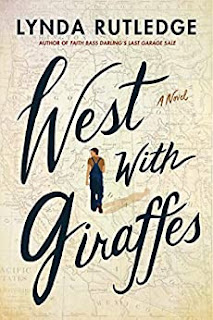This Christmas Hal and I gave each other books, as usual. (Doesn’t sound like downsizing, does it? But we intend to give away more than we add to the collection.) I gave him (us) the two volumes of Every Moment Holy by Douglas McKelvey, liturgical prayers to be read personally or in community. Beautiful and insightful. He gave me (us) a faith-gift, a guidebook to Oregon Hiking by Matt Wastradowski. This year, 2022, has been physically challenging to both of us, but we are trusting that we will be up and hiking again in beautiful Oregon in 2023.
I like to do a “Best Books List” at the end of every year. These are not books published in the current year, but books I read during the year, whenever they were published. They are not all the books I read; that list would be too long. But the best of the best, in my opinion. So, here they are.
Fiction
Diane
Akerman, The Zookeeper’s Wife (2007): Novel based on a true story of the
zookeepers of the large Warsaw Zoo during World War 2 who provided a half-way
house for Jews trying to escape the holocaust.
Pam Jenoff, The
Lost Girls of Paris (2019): Another World War 2 novel based on the true
story of two English girls who infiltrate French society as spies, to collect
information on Nazi strategies.
Jacqueline
Winspear: Various novels in her Maise Dobbs series about a detective in
England. Reminds me of Alexander McCall’s novels about detective Mma Ramotswe
in Botswana. Delightful.
Marie Benedict and Victoria Murray, The Personal Librarian (2021): Historical fiction based on the life of Belle Da Costa Greene, a black girl who passed as white and became personal librarian to J.P. Morgan.
Jodi Picoult,
Small Great Things (2010): Story of a back nurse falsely accused of
causing the death of a baby. About the pervasiveness of racism in our society.
Amor Towles, A
Gentleman in Moscow (2016): About a man sentenced by the Soviet police to a
life-time exile in a Moscow hotel. How he manages to make a meaningful life and
eventually escape. Funny and poignant.
Hillary Rodham Clinton and Louise Penny State of Terror (2021): Couldn’t put it down. A setting of international terrorism and conspiracy, with some thinly veiled references to an inept real-life former presidency and the problems it raised that continue to plague the country.
Lynda Rutledge, West with Giraffes (2021): Another novel based on a true story, of two giraffes who miraculously escape a hurricane at sea and then slowly journey across the US to the San Diego Zoo. Loved the characterizations of the funny, crusty people who accompanied them.
Non-fiction
Catherine
Randall, Lost in Wonder: The Life and Faith of Gerard Manley Hopkins (2020):
Fascinating biography of one of my favorite poets.
Christie
Tate, How One Therapist and a Circle of Strangers Saved My Life (2020):
Memoir of a very disturbed young woman whose relationships with men were
disastrous and her experience of healing through group therapy, something she
violently resisted at times.
Pete Grieg, How
to Pray: A Simple Guide for Normal People (2019): Simple, yes, but also
profound, practical, and encouraging.
Sarah Ruhl,
Smile: The Story of a Face (2021): Account of the author’s journey with
Bell’s Palsy, her process to come to accept it, live with people’s reactions to
her, and maintain hope for a cure.
Daniel Nayeri, Everything Sad is Untrue (2020): Memoir of the author’s escape, with his family, from Iran at eight-years-old, their journey across the Middle East and Europe as immigrants trying to find a home, eventually landing in the US and facing resistance. Told with humor while facing hard situations. Helped me enter into complex situations I will never personally experience.
Carolyn Leaf,
Switch on Your Brain (2013): While a little too formulaic, it gives a
biblical affirmation to the science of neuroplasticity and hope for building
healthy thought patterns.
Adam Grant, Think
Again: The Power of Knowing What You Don’t Know (2021): Presents principles
for keeping an open mind and changing perspectives according to the evidence.
The best part for me was the concept of “confident humility.”
Gregory A. Boyd, Present Perfect: Finding God in the Now (2010) and Benefit of the Doubt: Breaking the Idol of Certainty (2013): Boyd is becoming a favorite Christian author. Academically sound and spiritually profound.
Poetry
Mary Oliver, Devotions
(2020): Selected poems from all her many previous books, from 1963-2015.
Prolific poet with excellent poems scattered here and there, worth while searching
for.
Douglas
McKelvey, Every Moment Holy, Vol. 2: Death, Grief, and Hope (2021):
Beautifully written liturgies for the hardest times of life. Very helpful in
what proved to be a year of losses.
William Jolliff, At Rest in My Father’s House (2022): That I personally know the poet makes this book every more significant. Bill writes poems that come from his background in rural Ohio farmland. Both insightful and beautiful, I love this book. (The book is insightful and beautiful, not me. That was an ambiguous sentence.)
Drew Jackson, God Speaks Through Wombs: Poems on God’s Unexpected Coming (2021): The poet brings his own experience as a black man living in the US to these poetic responses to the first eight chapters of the Gospel according to Luke. Provocative and well worth meditating on.
So, this is my list. I’d love to
get the titles of some of your favorite books from 2022. One of the challenges
of these later years is that of continuing to learn. Books help.























%202.jpg)
